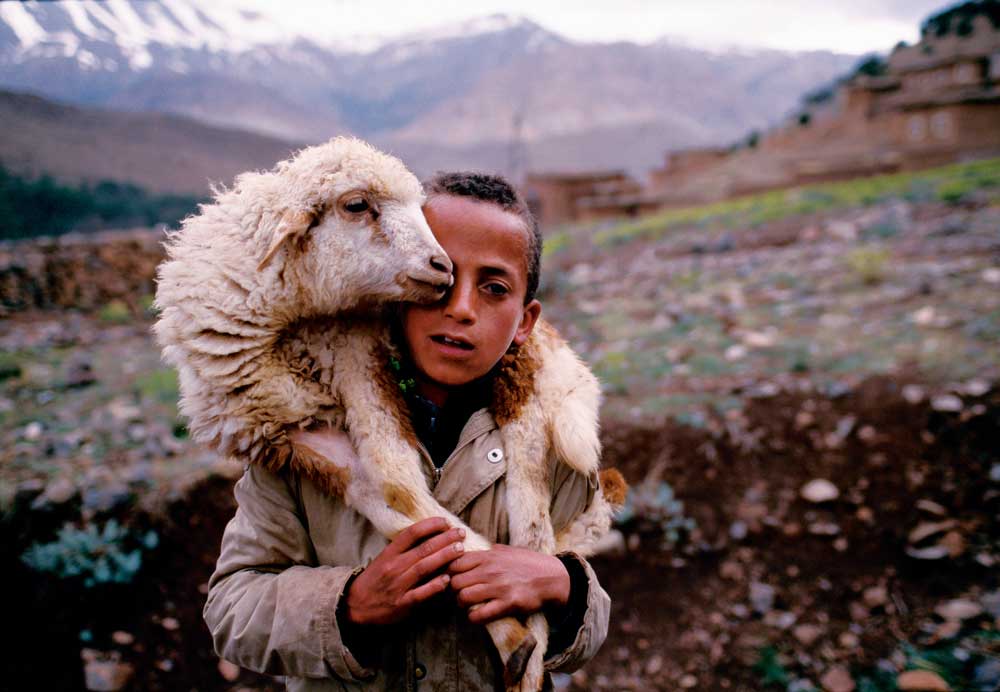Task 20 – Prepare for luck
Task 20
Prepare for luck

To begin with he smiled an artificial, photograph smile. I had to be patient, take picture after picture and wait until both the lamb and the boy began to relax. Then they became ‘themselves’. I didn’t give up until the photo was in the can.
Since I always have a Polaroid camera with me, I could give him a picture afterwards, and he probably still has it. In that way I can always give something back for the photo that I have taken. Besides, it gives me the courage to stretch the patience of the person I’m photographing a little more.
How would this picture have looked if I had quit while the boy still had his ‘photo smile’?
Ait Bou Goumez, Morocco, 2004. Photo: Torkil Færø
Problem
Bad luck
Often I meet people who say they have bad luck. And others who say they are lucky. I have learned that it isn’t a coincidence of who ends up in which of these categories. Bad luck often consists of two components: A person avoids being prepared and doesn’t seize the chances that appear. But if you arrange things for the opposite to happen – make preparations and seize opportunities – then you often experience ‘having luck’.
“It’s so typical of me to have bad luck,” say people who often experience it. They are not looking for opportunities to get what they really want. And should one arise, they don’t see it or they hesitate so much that they lose it. Such ways of thinking and patterns of action – blaming circumstances – are something that we rid of ourselves as photographers naturally. We learn to stay a step ahead and be attentive so that the pictures are better.
As emphasized in a previous task, it is important to seize the moments that arise or, even better, to arrange things so that such moments can appear more often. Then you are also more prepared when an opportunity comes – so ready that you can grab Kairos by the fore- head. (See page 106.)
Often bad luck comes down to expectations. What we expect tends to happen. Do you expect to be lucky or unlucky? What tends to happen to you?
In which situation have you had ‘luck’, or ‘bad luck’? Was there something about the cir- cumstances that could explain the difference?
How relevant on a scale of 1 to 6 is this issue for you?:
Solution
Good luck = preparation + opportunity
“I was lucky here,” is something many photographers have said at workshops when we go through their best shots. But if we delve what’s behind the photo, it turns out that there was considerable preparation and training involved and that it was no coincidence that this photo- grapher pressed the shutter at the right time and at the right place.
I can hardly remember having seen a good picture that was the result of pure luck. Con- centration, experience, preparation and being decisive are always behind one. These qualities can be trained. The more we practice them the more automatic they become, both with and without a camera in our hands.
Many people who struggle with dealing with and preventing negative incidents from hap- pening, also struggle with causing positive ones. We learn how to do this in photography. We get the pictures that we prepare for. This is my experience: Your mindset changes your actions. Your actions changes your pictures. Your pictures changes your life.
The celebrated documentary photographer Steve McCurry chooses not to make a plan before he goes out to shoot. However, this is also a way of preparing yourself. He prepares for the unexpected, and the surprises tend to show up.
Other photographers choose subjects that they are especially interested in and are knowledgeable about. They have thought about how they are going to do the photograph- ing in detail. Even if the plans are not executed exactly, they are so prepared that they can tolerate being surprised and can improvise. The planning has made them freer.
Even if it is smart to plan, nevertheless the most important thing is just to start and rather make adjustments along the way. Many people plan for so long that the circumstances have change before they even get going.
PHOTO ASSIGNMENT:
Prepare and think through what you want to photograph today. Try to arrange conditions so that the picture will be good. Where are you most likely to find good pictures on this day?
How relevant on a scale of 1 to 6 is this assignment for you?:
BOOK SUGGESTION: How Luck Happens by Janice Kaplan
❞I will study and prepare myself, and someday my chance will come.
Abraham Lincoln
❞Victory awaits him who has everything in order; luck, some people call it. Defeat is certain for him who has neglected to take necessary precautions in time; bad luck, they call it
Roald Amundsen
❞
It’s a funny thing. The more I practice, the luckier I get.
Arnold Palmer
[note_editor]

